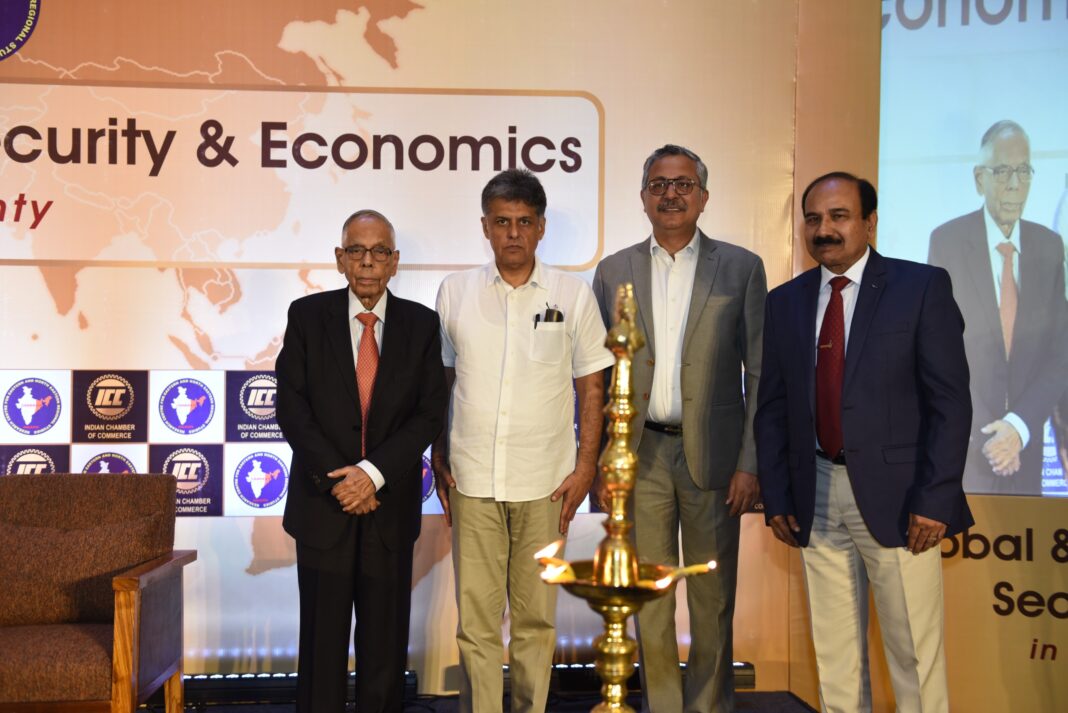As part of its centenary celebrations, the Indian Chamber of Commerce (ICC) convened a distinguished panel of eminent national figures for a thought-provoking discussion on “Global & Regional Geo-Politics, Security & Economics – In a World of Uncertainty”. Held at a time of mounting geopolitical flux and regional recalibrations, the session brought into sharp focus the underlying continuities and transformative shifts shaping global governance and security dynamics.
The event featured an illustrious line-up of speakers, including Mr. M.K. Narayanan , Former National Security Advisor of India and Former Governor of West Bengal; Mr. Manish Tewari , Hon’ble Member of Parliament; Arup Raha , Former Chief of the Air Staff of the Indian Air Force and President, CENERS-K; Mr. Ashok Kantha , Former Ambassador of India to China; Dr. Swapan Dasgupta , Former Member of Parliament; and Dr. Rajeev Singh , Director General of the Indian Chamber of Commerce.
In an incisive opening, Mr. Manish Tewari, Hon’ble Member of Parliament, discussed the enduring nature of state sovereignty in global affairs, arguing that while technological and economic forces may hasten international change, they do not supplant the centrality of national interests. “India faces a complex strategic environment in South Asia,” he noted, “with a persistently antagonistic Pakistan to the west, an increasingly assertive China to the north, an unpredictable Bangladesh to the east, and smaller neighbours attempting to navigate a delicate balance between New Delhi and Beijing.”
Tewari emphasized that this strategic geography necessitates a response rooted in realism: “These challenges strike at the heart of India’s regional doctrine and demand a response grounded in pragmatism and strategic clarity. The operations conducted from 7 to 10 May 2025 clearly affirm India’s resolve to act in its best interest in the face of evolving security imperatives.”
Former National Security Advisor Mr. M.K. Narayanan highlighted upon the contemporary global order, describing it as a “shambolic disorder” marked by the erosion of the much-vaunted rules-based international system. “Uncertainty is the only enduring constant,” Narayanan warned, pointing to the waning influence and moral authority of the United States, particularly under former President Trump, whose tenure saw a retreat into isolationism and transactional diplomacy.
Reflecting on India’s nuclear posture, Narayanan lauded the country’s principled adherence to its ‘No First Use’ nuclear doctrine, while issuing a stark warning: “Any nuclear confrontation with Pakistan would be catastrophic, unleashing devastation on a scale that would transcend borders and generations.” Drawing on his own experience leading India’s nuclear negotiations with the United States, he underscored the gravity of such scenarios.
Turning to the regional balance of power, Narayanan observed that China, propelled by civilizational imperatives, engages in “calibrated provocation rather than overt hostility,” calling for a diplomatic strategy that blends “resolve, prudence, and confidence in the depth
of our civilizational ethos.” He highlighted the vulnerabilities in India’s neighbourhood – from internal instability in Nepal and Sri Lanka, to the complex socio-political dynamics in Bangladesh, and the ongoing fallout of foreign intervention in Afghanistan, now under Taliban rule.
In a sobering analysis of modern warfare, Narayanan emphasized that the very nature of conflict is being reshaped by the emergence of cyber capabilities and artificial intelligence. Drawing parallels with the conflict in Ukraine, he remarked: “Cyber operations can inflict disruption comparable to, if not exceeding, conventional arms.” He called for a rethinking of military doctrines and ethical frameworks in an era where “algorithms and autonomous systems govern warfare.”
Echoing timeless philosophical reflections, Narayanan concluded with a poignant citation from the Isha Upanishad: “Into a dark darkness enter those who dwell in ignorance; into a darker darkness enter those who worship knowledge.” He emphasized that this ancient insight is a necessary caution against “the uncritical veneration of knowledge devoid of wisdom.”
Air Chief Marshal Arup Raha (Retd.), Mr. Ashok Kantha, and Dr. Swapan Dasgupta also contributed to the broader deliberation, offering nuanced perspectives on India’s strategic autonomy, regional diplomacy, and the interplay between ideology and geopolitics.



